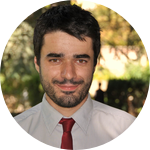About This Project
Justice systems can be represented as a graph: a network of nodes linked by different kinds of relationships. This approach allows for the discovery of emerging patterns and features otherwise unnoticed within the massive amounts of disjointed data generated by courts and tribunals — therefore shedding new, much needed light on the interactions of all players and constituent elements involved in law.Ask the Scientists
Join The DiscussionWhat is the context of this research?
This research will be a continuation of our previous work on social networks analysis in international courts and tribunals, as well as the ArbyX project at Stanford's Legal Informatics Department, an attempt to coordinate information among institutions to improve the possibilities of conflict checks, information disclosure and the understanding of decision-making philosophy and techniques of neutrals.
What is the significance of this project?
Recent developments in the quantitative analysis of complex systems and networks, both social and semantic, based largely on graph theory, will be applied to the study of international justice, a field of research still struggling to come to terms with the challenges and opportunities of the information age. Results, we postulate, can have a decisive impact on how law is studied, assessed and, ultimately, formulated and enforced.
What are the goals of the project?
The main goal of this project is demonstrating the relevance and importance of the proposed techniques, while providing the necessary resources for its adoption by the legal research community at large. In order to achieve it we will create and publish an open access graph database containing structured data from a growing number of courts and tribunals, customized tools, and a detailed log of our own analyses, discoveries and theses.
Budget
The expenses listed will cover basic licensing and development costs necessary to perform the research, and allow us to effectively share the progresses made with the rest of the community — by providing open access to the database contents, a system API, and both exploratory and explanatory interactive visualizations to navigate and make better sense of the collected data and results—. The stretch goal (7.400$ and over) would allow us to operate longer, cover more jurisdictions, and add extra features both to the back and the front end of the research platform.
Endorsed by
Meet the Team
Affiliates
Team Bio
Sergio graduated summa cum laude and received his law degree from ITAM, Mexico’s leading academic institution. He earned a masters in International and Socio-Legal Studies (JSM) and a doctoral degree (JSD) in International Economic Law, at Stanford Law School. He is co-founder of Tradelab, an on-line community-based platform to facilitate legal assistance and services related to international trade and investment matters, as well as the Open Law Index, a measurement of the degree of openness and transparency of justice systems, along with Enric G. Torrents, former delegate of a chamber of commerce in Shanghai, master in international trade, and L.L.M. Chinese Business Law student at Hong Kong Open University.We also count with the collaboration of, among others, professor Larriba-Pey, creator of the high-performance graph database DEX, and Dr. Sébatien Heymann, one of the project leaders of Gephi, a network analysis and visualization tool.
Sergio Puig, J.S.D.
Dr. Sergio Puig is a Lecturer in Law and a Teaching Fellow in the
Stanford Program in International Legal Studies (SPILS), as well as a Research Fellow at the Center on the Legal Profession and the Center for Legal Informatics. His main academic interests include topics related to international economic law, international arbitration, law and society, and the legal profession. Sergio graduated summa cum laude and received his law degree from ITAM, Mexico's leading academic institution. He earned a masters in International and Socio-Legal Studies (JSM) and a doctoral degree (JSD) in International Economic Law, at Stanford Law School. He has also co-founded TradeLab (tradelab.org), an on-line community-based platform to facilitate legal assistance and services related to international trade and investment matters, and the Open Law Index (index.weboflaw.com).
Enric Garcia Torrents
Enric is a dedicated physician-scientist in training and a doctoral researcher at the Medical Anthropology Research Center at University Rovira i Virgili in Spain. His work is primarily focused on the intersection of social and health sciences. His current project, funded until October 2026, aims to explore ways to eliminate coercion in mental health settings.
Enric has a diverse research background, having worked with institutions like Stanford Law School, the University of Arizona, and The Graduate Institute Geneva. His research has spanned from social networks analysis to the study of cognitive biases in decision-making processes in international disputes. He has also explored the potential genetic basis of schizophrenia and the effects of the neuritin gene on cortical thickness.
Academically, Enric engaged in a dual degree in neuroscience and smart systems from Keele University, holds a degree in evolutionary anthropology from University Rovira i Virgili and Universitat Oberta de Catalunya, and a Master's degree in biological anthropology from the Universitat de Barcelona and Universitat Autònoma de Barcelona. He also holds postgraduate degrees in collective mental health and dialogical practices.
In addition to his academic and research roles, Enric has significant experience as a working group member of EU COST (European Cooperation in Science and Technology) science and cooperation actions. He has contributed to the ReMO (Researcher Mental Health) and FOSTREN (Fostering the Reduction of Coercion in Mental Health) initiatives. The ReMO initiative focuses on the mental health of researchers, a critical but often overlooked aspect of the research ecosystem. The FOSTREN initiative, on the other hand, aligns with Enric's current project, aiming to reduce coercion in mental health settings. His involvement in these initiatives demonstrates his commitment to improving mental health both within and outside the research community.
Press and Media
This line of research is related to published papers such as: Puig, Sergio "Social Capital in the Arbitration Market", 25 European Journal of International Law (2014, Forthcoming) and Puig, Sergio and Torrents, Enric G. "The Case for Linking World Law Data", 2 Journal of Open Access to Law (2014, Forthcoming). You can learn more about our project by reading the short article "Should We Graph The Entire Justice System?" published at Wired Insights. The initiative has been featured by the Open Science Data Cloud, a network providing parallel computing capabilities to research endeavors, and the Open Knowledge Foundation, which is supporting our efforts by advocating the release of judicial and legislative information in open data standards worldwide, as well as Thunderclap, MundoSpanish and many other media.Additional Information
Main photograph attribution: Mahdi Abdulrazak, licensed under CC BY-NC-SA 2.0. We want to thank all our supporters: the hundreds of people who are helping us code it all, crack the problems, spread the word,... those who have partnered with us, are contributing with their ideas, giving us strength and courage to continue, those who criticize us when necessary,... everyone who is contributing to make it a reality. To all of you, moltes gracies, muchas gracias, merci beaucoup, obrigado, thank you, 太谢谢你了! You are truly amazing!Project Backers
- 13Backers
- 102%Funded
- $3,796Total Donations
- $292.00Average Donation




